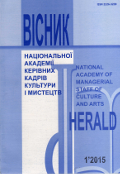THE COMPOSER’S CREATIVITY OF M.K. CHURLONIS AND I.V. TYLYK: THE SYSTEMACY OF MUSICAL THINKING IN THE CONTEXT OF THE PRINCIPLE OF THE PHENOMENOLOGICAL SIMILARITY
DOI:
https://doi.org/10.32461/2226-3209.1.2015.138354Keywords:
systemacy, musical thinking, principles of phenomenological similarities, cosmism, theurgy, the language of music, composer creativityAbstract
The article is devoted to the analysis of the composer’s creativity of M. K. Churlonis and I. V. Tylyk in the context of the principle of the phenomenological similarity. The article covers the features of philosophical world outlook, image-associative perception and spiritual spheres of musical thinking of the composers. The article characterises the artistic and philosophical trend cosmism as a conceptual implementation of composers’ attitude and outlook. It investigates the semantic parallels in theurgical aspect in the works of M.K. Chiurlionis and I.V. Tylyk as a manifestation of virtual communication with supreme cosmic mind. The article considers the features of the musical language of the composers. It analyzes the works of M.K. Chiurlionis ("Our Father", "De profundis") and I.V. Tylyk (triptych "Under the Sign of Eternity", "Prayer", "Repentance. Open the door for me Giver of Life"), which are marked with the plot and thematic similarity of spiritual love to the Divine Creator.
Downloads
Published
Issue
Section
License
Authors who publish with this journal agree to the following terms:
1. Authors retain copyright and grant the journal right of first publication with the work simultaneously licensed under a Creative Commons Attribution License International CC-BY that allows others to share the work with an acknowledgement of the work's authorship and initial publication in this journal.
2. Authors are able to enter into separate, additional contractual arrangements for the non-exclusive distribution of the journal's published version of the work (e.g., post it to an institutional repository or publish it in a book), with an acknowledgement of its initial publication in this journal.
3. Authors are permitted and encouraged to post their work online (e.g., in institutional repositories or on their website) prior to and during the submission process, as it can lead to productive exchanges, as well as earlier and greater citation of published work (See The Effect of Open Access).


